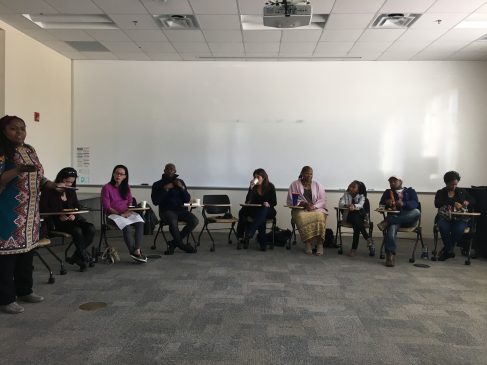
Bringing the not just the “gritty backdrop of rundown Brooklyn” to Sarasota, but also the sociological and emotional complexities based on the real-life tragedy of Trendon “Tray” Franklin’s murder, the Florida Studio Theatre’s “brownsville song (b-side for tray)” by Kimber Lee sparked a dialogue in Sarasota. Visiting New College, nine actors and theatre members brought that dialogue directly to students and faculty.
The play, written by playwright Kimber Lee, is her fictional take on the story, following Tray’s family’s struggle to endure their shocking tragedy. Given the parenthetical subtitle “(b-side for tray)” to represent the neglected, considered-secondary side of things, the play is a way for Lee to give voice and humanity to the people of America that often get lost and forgotten as people in the statistics of crime and violence in the nation.
“This is the unspoken and unrecognized person in our culture,” director Kate Alexander said in an interview with the Sarasota Herald-Tribune. “We’re speaking about a family and a young man who are the most vulnerable in our society. It points out that it’s the B side, the side we don’t hear about.”
Despite a modest reception of only 13 audience members – consisting of mostly students and a few faculty members – the conversation was lively, engaging and intimate. Hosted by Assistant Professor of Sociology Queen Zabriskie, the panel of guests exchanged lengthy dialogue with the students and each other, with the conversation ending well past the hour-long time limit. The panel consisted of Alice Gatling (who played “Lena”), Wesley Jones (“Tray”), Warren Jackson (“Junior”), Deysha Nelson (“Divine”) and her mother, Tanisha, Rachel Lu (“Merrell”), Associate Artist Catherine Randazzo and FST Stage Management Intern Rebecca Li Grady, who brought a bevy of insights into both the performance and theatre itself.
Zabriskie broke the ice, explaining how her trip to see the play with students inspired NCF to reach out to the theatre to bring the discussion to campus.
“That’s what this is, a kind of informal conversation,” Zabriskie said. “It’s a chance for folks who’ve seen the play to ask questions, and for folks who haven’t seen the play to just come and have a conversation about your work at the theatre and with the play.”
With that, the mic was figuratively passed to the panel, with Catherine Randazzo taking the reins first.
“We’re a non-profit theatre that is striving to make the plays accessible and affordable to as many people as we possibly can,” Randazzo said, introducing the group as a whole and some broad goals of the theatre and play. “Our mission is to open up conversations, to be very transparent with what we’re talking about and to hope that these plays will not only change the lives, but change the question – or the thought process – of where you are in your life.
“Sarasota itself is a very interesting spectrum of very conservative thought processes,” Randazzo continued. “So this play really changes our audience’s thought processes, and that’s why it’s so important to not just pander to them, but to challenge…”
The panel of guests introduced themselves and their most memorable role in theatre, seated under the whiteboard of ACE 102, during which Rachel Lu revealed her role as “Tiger Mom” in ABC’s show “What Would You Do?” and Alice Gatling made the room roar with laughter in her brazenly confident assertion that she “wore out” her first role as an actor – a tree.
After everyone had introduced themselves, Zabriskie asked another question, offsetting the initially timid student audience.
“I wanted to know how you all prepared for your role [when approaching such a tough subject]?”
“One thing I am always looking for is: what can I bring out in the character that can cause the audience to love them,” Gatling responded, noting her insistence on not just playing an angry grandmother in Lena. “It was important for me to look for what are the moments where I can bring humor? What are the moments when we can lighten things up in this play? Where can I do something that brings laughs, that brings some sort of joy and fun?”
“I try to look deep into the script and get a feel for the emotion and what the script is about,” the 8-year-old Deysha Nelson said. “I really want to touch the crowd. What they’re trying to find in the play, what emotions that this little girl is bringing in the play.
“I do cry in the play, and I always think about my cousin, who passed away in August. So I always think about that, and how sad I was and how sad other families can be when they lose someone close to them,” Nelson finished, before passing the now-teary figurative baton.
With a little bit of infectious laughter and honest emotion, the room opened up and students began asking their own questions, many having seen the play. The questions didn’t let up until Zabriskie finally had to end the event at 12:30 p.m., before the whole room – students, faculty and guests together – took a group picture.
The dialogue had concluded, but the significance of it lingered palpably within the classroom, most exemplified in Gatling’s earlier pondering: “With this community, and getting them to get past the ‘Other’, how do you get them to realize a young man getting shot in Brownsville, New York, still has an impact on their life?”
